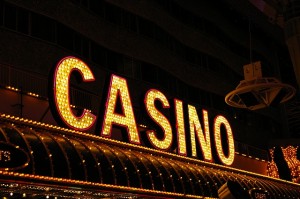Analysis of Casino in Popular Culture
 Hollywood is no stranger to casinos, which is absolutely understandable – considering just how much revenue they bring in every year just in Las Vegas alone, it’s safe to say that they’re a big part of American culture. As a result, many directors like to depict casinos within their motion pictures in an attempt to tap in on the casino market and attract the large casino crowd… Or just because they feel like it’ll enhance the story and make for a more cohesive plot, but that’s insane, isn’t it? However, one has to keep in mind that in many movies things aren’t quite what they seem. A skilled director can use a certain element not just for its face value, but also for its symbolic meaning. When Charles Foster Kane whispered “Rosebud” with his dying breath, he wasn’t just thinking of what a kick-ass sleigh he used to have as a kid, he was admitting that his childhood was the only time in which he was happy, and the director used his “Rosebud” sleigh as a symbol of that childhood happiness. Similarly, a lot of directors like to attach symbolic meaning to something as normal to us as casino, or casino games.
Hollywood is no stranger to casinos, which is absolutely understandable – considering just how much revenue they bring in every year just in Las Vegas alone, it’s safe to say that they’re a big part of American culture. As a result, many directors like to depict casinos within their motion pictures in an attempt to tap in on the casino market and attract the large casino crowd… Or just because they feel like it’ll enhance the story and make for a more cohesive plot, but that’s insane, isn’t it? However, one has to keep in mind that in many movies things aren’t quite what they seem. A skilled director can use a certain element not just for its face value, but also for its symbolic meaning. When Charles Foster Kane whispered “Rosebud” with his dying breath, he wasn’t just thinking of what a kick-ass sleigh he used to have as a kid, he was admitting that his childhood was the only time in which he was happy, and the director used his “Rosebud” sleigh as a symbol of that childhood happiness. Similarly, a lot of directors like to attach symbolic meaning to something as normal to us as casino, or casino games.
Since there’s so many different directors and creative visions, there’s obviously many different interpretations of what the casino symbolizes to each individual set of characters. However, after watching plenty of movies themed after casinos, or featuring casino games as an element, I think I’ve pretty much managed to separate them into three very neat categories. And, as you’ll find out soon enough, pretty much every single movie that features a casino (or even gambling) in it falls squarely into one of these categories. The first category is “casino as a ray of hope”. In those movies, the casinos is seen as some kind of bright dream or aspiration, or an unexpected win at a casino game brings positive change to the protagonist’s life. In “Ocean’s 11”, while the titular Ocean and his group of thieves are looking to rob a casino and not play it, said casino is still their goal, objective and chance for a better life. In “Run Lola Run” (or at least in one of its timelines – it’s a confusing movie), an unexpected win at the roulette table allows Lola to settle the debt at the core of the story. In the Ashton Kutcher comedy “What Happens in Vegas”, an unexpected jackpot win while playing slots prompts a newly married couple to stay together when they would’ve otherwise broken up, and subsequently they find true love. In “The Hangover”, the group’s unexpected wins at the blackjack table allow them to settle a debt they’d unknowingly accumulated during their drunk bachelor party and eventually fulfill their objective by finding the groom they’d lost. In all of these examples, casinos and casino games are seen as something positive and helpful, something that will make the protagonist’s life better, or already has.
And then there’s the exact opposite. Many directors see the casino as a soul-sucking black hole of despair that will undoubtedly ruin the lives of anyone associated with it. Thus, the second category is “casino as a corrupt force of evil”. When Martin Scorsese, the director of “The Godfather”, decides to direct a movie titled “Casino”, you know it’s not going to be about cartoon slots and funky dealers. In that movie, the casino is nothing more than a front for a criminal empire that very gradually corrupts a low-level Mafioso into a ruthless crime boss. None of the people associated with the casino wants to be part of it, and yet they find that they have no other choice – its evil influence is just too strong. Something similar happens in “Croupier”, where the titular character (played by Clive Owen in his first major role) is turned from an idealistic writer into a nihilistic sadist after being exposed to the roulette table, and the way it drains people of their hopes and dreams. The roulette is represented as something evil which corrupts this young man and his work, with the ultimate revelation that it was all for naught – once again, his job is revealed to have been nothing more but a front for criminal activity. “The Gambler” doesn’t go that far, but it depicts a character struggling with gambling addiction who only manages to find his happy ending by completely denouncing the casino and its influence and learning to instead lead a normal, healthy life.
The third category is sort of a mix between the first two, where the casino is represented as both something good and something evil, or first appears to be one thing and then turns out to be another. A great example is the classic “Casablanca”, the proto casino movie. In it, the casino is clearly portrayed as something evil – it’s a representation of Rick’s stagnation, and his refusal to go on with his life or pay attention to the world around him. It’s his own bubble which he’s built for himself due to previous circumstances, and it’s only by breaking out of it that he can achieve his happy ending. However, the casino is also represented as a force for good, as it helps the Bulgarian couple get their passports and continue their travel to America – if Rick and his casino hadn’t been there, the young wife would’ve been forced to prostitute herself in exchange for the passports. “21” is another great example, because at first the casino seems like an aspiration that the main character is striving towards, making this an example of the first category, but soon enough things go south and it’s revealed that the situation isn’t as peachy as it had originally seemed, and that the casino (or rather, the protagonist’s group that attempted to exploit the casino by counting cards) holds dark secrets. “Casino Royale”, if it can be considered a casino movie, would fall into this category as well. While James Bond needs to play casino games in order to fulfill his first mission and achieve his goal, the mission is perilous and he suffers many attempts on his life over the course of the poker tournament.
While there are plenty of casino-themed movies that I didn’t mention (either because I haven’t seen them or because I didn’t need to bring them up, as this article is long enough), I feel like all of them fall quite neatly into one of these three categories. What do you think? Is there a casino movie that falls into a different category? If you have one for me, please let me know by contacting me!

 I open my blog with two of my favourite pieces of cinematography. The French film Bob le Flambeur was released in 1956 and an English-language remake was shot half a century later, The Good Thief starring Hollywood’s favourite bad boy, Nick Nolte. I first saw the American production, then dug out the French original from our college library to see it. Which one did I enjoy more? That is a nice question. Let me think about it.
I open my blog with two of my favourite pieces of cinematography. The French film Bob le Flambeur was released in 1956 and an English-language remake was shot half a century later, The Good Thief starring Hollywood’s favourite bad boy, Nick Nolte. I first saw the American production, then dug out the French original from our college library to see it. Which one did I enjoy more? That is a nice question. Let me think about it. I am Dorian (but not Gray), hailing from Manchester. I am 21 and I love several things in life. None of them goes well with the others. That’s why I have many blogs and maintain a number of personae on social media. Thank God for Internet anonymity! Clouding the sky rocks even when not done with style.
I am Dorian (but not Gray), hailing from Manchester. I am 21 and I love several things in life. None of them goes well with the others. That’s why I have many blogs and maintain a number of personae on social media. Thank God for Internet anonymity! Clouding the sky rocks even when not done with style.